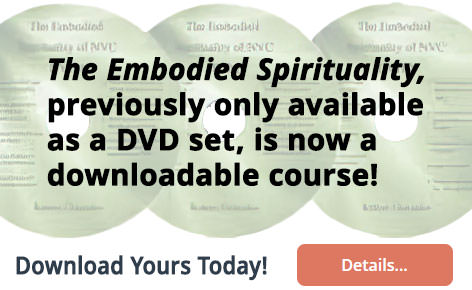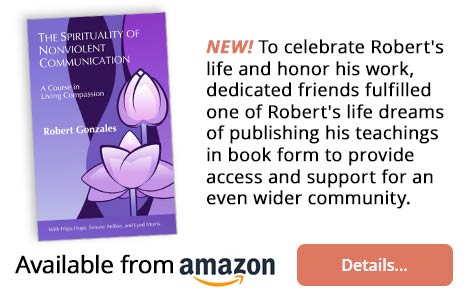

Welcome to the Robert Gonzales Training Legacy. Here you can learn more about Robert and the powerful teachings he dedicated his life to. NVC Academy is proud to house and share with you the complete body of his life's work. We invite you to explore, learn, and help keep his legacy alive!
Robert's passion was in the spirituality of the Nonviolent Communication (NVC) process. He saw NVC both as a process that helps people connect more authentically with themselves and others, and as a spiritual practice and way of living. The worldwide NVC community mourned when Robert died in 2021. He left behind a legacy of work that emerged from a lifetime of inquiry into the intersection between spirituality and human communication. More about Robert.
Article
4 - 6 minutes
The more we can stay present with our hurt, and own our interpretations, we are more likely to express what's important to us without blame and also to become resilient. From there, the listener can have more space to offer their full presence and empathy. Read on for more.
Details...Article
7 - 10 minutes
People find confrontation inspirational when done with full compassion and intention to support. To do this, transform your own judgments or distress, come with useful content plus spot-on timing, and the best interests of the receiver in mind. Read on for questions you can ask yourself in preparation for this, and more.
Details...Article
8-12 minutes
Unhook from a reactive dynamic, by staying with your needs and requests, and release attachment to outcome. Start by shifting your attention from the other person to get clear on what's true for you. Read on for strategies to transform reactivity, possible boundary setting behaviors, typical signs of escalation, and more.
Details...Practice Exercise
5 minutes
Listen to CNVC Certified Trainer Dian Killian guide and ease you into a more natural expression of empathy. This is a three person exercise. Listen in and then give it a try!
Details...Article
10 - 15 minutes
The “mind” or our “ego” are often depicted as a static entity, an unchangable part of human nature, and as obstacles or negative parts of ourselves to overcome. This view creates maligning, a split within us, while remaining invisibly part and parcel of authority-based societies --the dominant culture and institutions into which we are born. Instead, I want to advocate an integration of reason and emotion, mind and heart, plus self and others.
Details...Article
3 - 5 minutes
One clue we have trauma is when we respond in a way we don't want (eg. being reactive, self sabotaging, etc). Even when we have high level NVC skills our trauma-related mechanisms can activate, and we can lose access to well honed NVC skills. Read on for approaches that involve healing trauma, and approaches that involve managing the effects of trauma and preventing additional trauma.
Details...Article
3-5 minutes
Reducing overwhelm requires you to reconnect with your authentic choice, be present and compassionate with what's happening, heal trauma, and interrupt the trauma response. Read on for ways that may help you reconnect with your choice, presence and more on trauma.
Details...Article
12 - 18 minutes
Why is it so difficult to not take things personally? It's because everything reinforces the sense that whatever is being said is indeed about us – both from without and from within. However, we can get better at not taking things personally with a practice of shifting our focus by being open to multiple interpretations, understanding that our reaction is about our own need, and noticing how the other person’s words, no matter how they sound to us, are an expression of their needs. We can then be more present and available to navigate the situation.
Details...Article
5 - 8 minutes
Mindfulness is paying attention in a balanced and nonjudgmental way. To practice mindfulness is to uncover our own biases, revealing we less neutral and objective than we think. This takes great humility. Each time we become aware of our own unconscious biases and blind spots, our world expands. Read on for more about practices to help us see, and transform, our own biases.
Details...Article
3-5 minutes
Most reactivity in intimate relationships comes from a lack of confidence in maintaining intimacy, autonomy, or security. What may help is naming what's happening, interrupting shame, and anchoring or reassuring yourself. You can also reflect on the effects of acting from reactivity. Knowing what helps center you, ask your partner to do or say specific things that might help. Read on for more.
Details...

